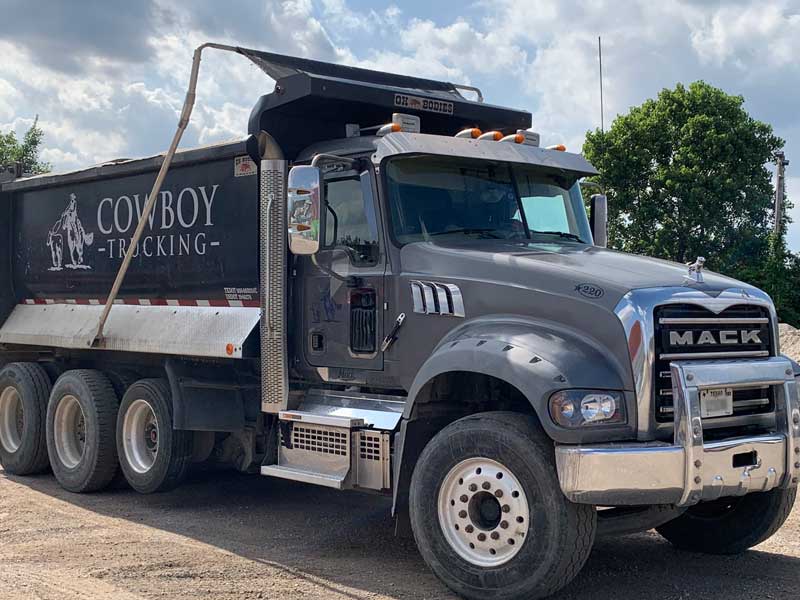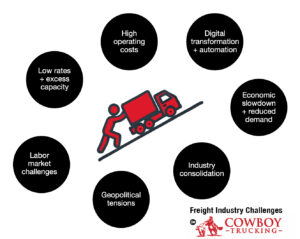
Professional trucking services in Texas are facing numerous challenges, many of which will affect you as a general contractor. Understanding these challenges will help you navigate the current and future landscape of freight logistics in Texas.
The state is investing heavily in its transportation and logistics systems, including major projects like
- the reconstruction of I-35 in Travis County,
- the widening of IH 10 in Colorado County,
- SH6 in Brazos County, and
- expansion of McKinney National Airport, and Houston George Bush and Austin-Bergstrom International airports.
These ambitious projects involve significant hauling services for materials and equipment and need robust logistics support. Yet there are currently many freight industry challenges, including:
- low freight rates
- excess capacity
- high operating costs
Understanding these challenges for professional trucking services is crucial for navigating the current and future landscape of freight logistics in Texas.
We’ll look at the main freight industry challenges before considering the outlook.
Low Freight Rates and Excess Capacity
The Texas freight industry in general (i.e. all types of freight) is currently grappling with the dual challenges of low freight rates and excess capacity.
This is primarily driven by the lingering effects of the pandemic, which initially caused a surge in demand for freight services. However, as the global economy slowed down, the demand for freight services diminished, leading to an oversupply of capacity in the market.
Low freight rates are a significant concern for carriers who then struggle to cover their operating costs, which include elevated expenses for fuel, labor, and insurance.
The introduction of new emissions standards has further exacerbated these costs, putting additional pressure on trucking companies to remain financially viable.
However, it’s difficult for carriers to charge higher rates. That’s because excess capacity in the market means there are more trucks available than there are goods to be transported! This means increased competition among carriers, which drives down prices even further. Smaller carriers, in particular, are struggling to survive in this environment, with some being forced to cease operations entirely.
Without significant changes, professional trucking services will continue to face financial difficulties. This could ultimately impact the broader logistics network and the timely completion of vital infrastructure projects across the state. Infrastructure depends on much more than the obvious construction materials and equipment!
High Operating Costs
High operating costs continue to strain the freight industry in Texas. Trucking services are dealing with elevated expenses in several key areas, as we mentioned in a previous post.
The introduction of stringent emissions standards has further increased costs – particularly affecting the price of new trucks and the maintenance of existing fleets.
And the rising costs of regulations and compliance add to the financial burden on trucking companies. All this makes it challenging for carriers to maintain profitability.
Digital Transformation and Automation
The freight industry in Texas is rapidly adopting digital transformation and automation to streamline operations.
Third-party logistics providers (3PLs) are integrating advanced API systems into shippers’ transportation management systems (TMS) to support real-time updates and enhance efficiency in rate quoting and load booking.
This shift towards automation is helping companies manage capacity better and make informed decisions, which is critical in the current challenging market environment.
However, it’s also increasing costs in several ways:
- Training will be necessary – which smaller trucking companies may struggle to invest in.
- Smaller providers will not be able to optimize operations and offer the lower rates that larger companies can.
- Robust cybersecurity is critical for the extra data involved.
Economic Slowdown and Reduced Demand
Professional trucking services in Texas are also feeling the impact of the global economic slowdown. Persistent inflation and high interest rates dampen both consumer spending and business investment – which contributes to the subdued demand for shipping and logistics services. This reduction in demand exacerbates the challenges of excess capacity and low freight rates, making it difficult for carriers to maintain profitability. It can seem like a vicious circle!
Industry Consolidation
There is now a more consolidated market, where larger logistics companies are acquiring smaller ones or expanding their capabilities to dominate the industry. This consolidation can help streamline operations – but it also reduces competition. In turn, this affects pricing and service levels for freight hauling services.
Impact of Geopolitical Tensions on Professional Trucking Services
Geopolitical tensions, such as trade disputes and international sanctions, have added complexity to the global freight industry. Specifically in Texas, issues like the tightening of border controls with Mexico and tariffs on goods have disrupted supply chains and increased operational costs.
Additionally, the recent emphasis on nearshoring due to strained relations with overseas trading partners is reshaping freight patterns. This affects how and where goods are transported within and through Texas.
Labor Market Challenges
The freight industry in Texas is facing a significant labor shortage, particularly among truck drivers. An aging workforce in professional trucking services and the difficulty in attracting new drivers have exacerbated the issue of driver shortages, leading to a shortfall of qualified personnel.
High turnover rates and increasing competition for labor from other industries further compound the problem. This makes it challenging for carriers to maintain their operations efficiently for you, the general contractor.
However, the future is not all bleak. We said we’d look at signs of recovery, so let’s turn to that aspect now.
The Future Outlook for Professional Trucking Services in Texas
Despite the challenges listed above, there are signs of potential recovery in the Texas freight industry. A slight rebound in container demand and increased investments in infrastructure projects provide optimism for the future.
Strategies to overcome these challenges include:
- embracing digital transformation to enhance efficiency
- leveraging data analytics for better decision-making.
Additionally, focusing on workforce development and retention can help address labor shortages through:
- improved training programs
- competitive compensation
We believe these improvements are essential for the timely completion of your projects and will bring you more reliable and efficient freight services for construction hauling.
Cowboy Trucking is Your Reliable Partner in Facing Freight Industry Challenges
At Cowboy Trucking, we have decades of experience in the trucking industry in Texas, facing ups and downs and surviving as a reliable solution to your trucking needs. We live by the motto of our founder, the original “Cowboy,” and get the job done. This means facing the challenges for professional trucking services, partnering with you to ensure your project finishes on time, and keeping communication channels open.
We have a full fleet of over 100 trucks available for all your infrastructure trucking and hauling – and have won the approval and recommendation of both federal and state contractors over the years. Contact us today and let’s talk!
Image ©cowboytruckingdfw.com

